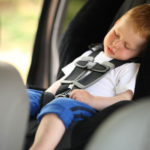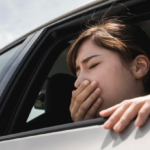During the holidays, you often take your child to visit relatives in the countryside or go on trips with your family. Long journeys in buses or coaches can make your child prone to car sickness and vomiting. This can be quite inconvenient as your child will arrive at the destination feeling exhausted and unable to enjoy the holiday. Therefore, the following methods will provide safe and effective ways to prevent car sickness in children.
See also: Effective ways to prevent car sickness without medication
Why do children get car sick?
Car, sea, and air sickness share similar causes. When you sit in a moving vehicle, your eyes focus on the stationary objects in front of you, sending a signal to your brain that you are not moving. However, the vestibular system in your ear, which is responsible for balance, sends a conflicting signal to your brain that your body is in motion.
This conflicting information confuses the brain, leading it to believe that the body is being poisoned. As a result, the brain releases chemicals to combat this perceived toxin, causing symptoms such as dizziness and nausea.
Related: 13 effective acupressure points to relieve car sickness instantly
Effective ways to prevent car sickness in children
1 Choose a seat away from the back of the vehicle
Seats that are further away from the back of the vehicle, such as those in the middle or closer to the driver, experience less jerking and jostling. Therefore, sitting in these positions can reduce the likelihood and severity of car sickness in children.
 Choose a seat away from the back of the vehicle
Choose a seat away from the back of the vehicle
2 Travel at night
When traveling at night, children tend to feel sleepy and may sleep through the entire journey. This means they will not experience any car sickness during the trip.
3 Give your child ginger
According to herbalist Dinh Cong Bay, the best way to administer ginger is by giving your child ginger candy or a small amount of warm ginger tea with sugar. However, this remedy is only suitable for children aged two years and above.
In fact, children under two years old are usually not affected by car sickness, so parents can rest assured.

4 Use acupressure
If your child is over three years old, you can try acupressure by pressing the Hegu and Neiguan acupressure points to relieve car sickness symptoms.
The Hegu point is located in the webbing between the thumb and index finger, slightly above the crease.

The Neiguan point is located on the inner forearm, about two centimeters above the wrist crease, between the two tendons.

5 Encourage your child to look out of the window
Car sickness occurs when the signals from the eyes and the body’s sense of movement contradict each other, confusing the brain. To prevent this, encourage your child to look out of the window at distant objects, helping their body recognize that it is in motion and reducing the likelihood of car sickness.
Should you use motion sickness medication or patches for children?
While motion sickness medication and patches can be effective, they may cause adverse reactions and side effects in young children.
Pediatrician Truong Huu Khanh advises that motion sickness patches are typically only suitable for children aged 12 years and above and adults.
Oral motion sickness medications are generally not recommended for young children. If your child does experience car sickness, it is best to stick to the aforementioned folk remedies.
If you are considering the use of medication, it is important to consult a doctor first to ensure the safety and well-being of your child.
Holidays, especially during Tet, are a great time to take your child on trips with the family. However, car sickness can dampen the mood of the trip. Therefore, the aforementioned methods will help your child stay energetic and cheerful throughout the journey.
Tips for Reducing Risk of Severe Covid-19 Symptoms in People Infected With the SARS-CoV-2 Virus
As the SARS-CoV-2 virus continues to mutate, individuals infected with the virus are now facing an array of different symptoms. From fever to body aches to difficulty breathing, managing the symptoms of the virus is now more important than ever. Doctors are playing a vital role in ensuring patients receive the appropriate treatment for their symptoms, but it is also important for patients to learn how to effectively manage their own symptoms. Read on to find out more.





































